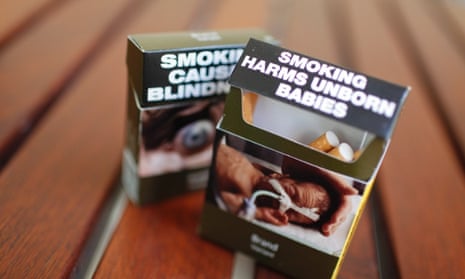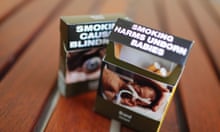Claims that plain cigarette packaging would hurt small independent retailers and increase use of illicit, unbranded tobacco have formed the core of big tobacco’s argument against plain packaging.
But those arguments have been debunked by new Victorian research, which public health experts have described as a win for science.
Australia was the first country in the world to introduce standardised packaging for tobacco products in December 2012. New Zealand, Ireland and Britain are considering similar legislation.
Researchers from the Cancer Council Victoria surveyed almost 2,000 adult smokers from across the state one year before plain packaging began, during its rollout and one year after implementation.
Almost two-thirds of respondents said they bought their tobacco from supermarkets in 2011 and again in 2013. There was no fall in the proportion who bought from small independent retailers – just over 9% bought their tobacco in those outlets in 2012 compared with just over 11% in 2013.
Use of low-cost Asian brands and illicit tobacco was low and scarcely changed between 2011 and 2013.
The lead author of the study and a senior policy adviser for tobacco at Cancer Council Victoria, Dr Michelle Scollo, said that big tobacco had claimed plain packaging would increase the time it took for customers to be served in small retailers, driving them towards large supermarket chains.
“So there was a lot of fear and concern aroused among small business, and there was a large advertising campaign funded by tobacco through retail groups opposing the legislation,” Scollo said.
“What this study now shows is there has been no shift away from small outlets, which is a lesson for other countries considering plain packaging to be sceptical about the claims and fearmongering of the tobacco industry.”
The findings, published in the BMJ Open on Friday, prove there was no evidence of these unintended consequences of plain packaging, the authors wrote.
A professor of public health at the University of Sydney and tobacco control expert, Simon Chapman, said big tobacco feared a domino effect of plain packaging reforms around the world with nine countries implementing or considering it.
“Canada was the first country to introduce graphic warnings on cigarette packets and within 10 years, 60 other countries had followed suit,” Chapman said.
“California did the first banning of smoking in restaurants and now that has swept throughout the world. There are many examples in tobacco control policy of the domino theory at work.”
The tobacco giant Philip Morris has threatened to sue the British government if it forges ahead with its plain packaging reforms.
The arguments from tobacco companies against plain packaging made no sense whatsoever, Chapman said.
The arguments from tobacco companies against plain packaging made no sense whatsoever, he said.
“Of course smokers have always known, even before plain packaging, that cigarettes are cheaper in supermarkets,” he said.
“So the only thing that would drive more people away from small retailers would be if supermarket prices fell even further.”
A number of reports have shown that cigarette packaging design is a powerful way for tobacco companies to appeal to consumers and mislead them about the harm caused as a result of using tobacco. It is also used as a way of marketing towards young people.
The president of the Australian Council on Smoking and Health, Professor Mike Daube, said the research had “meticulously exposed” the lies told by tobacco companies.
“Tobacco specialises in false claims and dodgy reports, hoping that nobody will expose them,” he said.
“That’s why this paper is so important.”
But he said he believed tobacco companies would simply find other ways to promote smoking and discredit tobacco reforms.
“This is an industry that has made a specialty out of lying for the past 60 years and they have become more sophisticated in their methods,” he said.
“But this paper meticulously exposes some of their key claims as false and this will be especially important for the UK and other countries considering plain packaging – it should be required reading for every politician in those countries.”
But the chief executive of the peak body representing the convenience store industry in Australia described claims that plain packaging was working and not negatively impacting retailers as damaging and insulting.
“We have every respect for the work Cancer Council Victoria does in improving health outcomes,” said Jeff Rogut, from the Australasian association of convenience stores.
“However, problems arise when bodies such as this presume to be experts in the retail sector and present their findings as truth.”




Comments (…)
Sign in or create your Guardian account to join the discussion